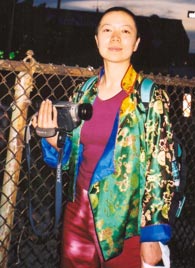Well, according to a new documentary, Women 50 Minutes (女人50分钟), by lesbian filmmaker, Shitou, such a village does exist. Dykes, it says, have taken over a small town in Guizhou province.

Shot by lesbian filmmaker, Shitou (above), Women 50 Minutes comprises footage shot in the developing regions of Tibet, Qinghai and the southwest, as well as metropolitan Beijing between 2000 and 2004. She is better known for her role in Fish and Elephant, the country's first lesbian movie.
In the film, a dozen or so young women are packed into a living room, eating, laughing, drinking huang jiu (a type of Chinese alcoholic beverage brewed directly from grains) and flirting. "You drink like a fish!" one girl shrieks. "Really impressive!" "Do you like me?" another girl coyly asks another. The camera zooms in on a boyish girl with short hair and glasses who is sitting quietly, apart from the party. Qiu Qiu, the subtitles say, is going through a sex change. She will become a man two years after this scene was filmed.
The 50-minute documentary doesn't just focus on lesbians. Between 2000 and 2004, Shitou filmed ordinary women - mostly straight but some gay - in Tibet, Qinghai, Guizhou and Beijing.
"I wanted to explore the different ways that women live in these places, and by showing how different they are you can see how society is changing and how women's lives are changing," Shitou says.
The film was shown to much acclaim at NYU's Reel China documentary festival last year, Shitou says.
In Women 50 minutes Shitou has pieced together extended snapshots of life, but draws few conclusions. The 36-year-old uses her artistic roots - she was part of the legendary Yuan Ming Yuan artist colony in Beijing in the early nineties - to experiment with film. Her camera is a fly on the wall and the audience is free to interpret the scenes as they wish.
Shitou revisits the lesbian theme a little later in the film. But this time the women, also in Guizhou, are in their eighties and nineties. The subtitles tell us Granny Chen and Granny Yu have been in love for over 80 years. The camera pans half a dozen couples sitting on benches. The women sit close, chatting, laughing and hugging. One couple has their arms around each other. But no one pair is singled out.
"I didn't want to name names, pick out women, but you can see them everywhere," says Shitou. "Because they grew up 80 years ago, they couldn't live as lesbians then. They got married and had kids. Now they can spend time with each other."
Shitou, who is from Guizhou herself, is China's first out lesbian celebrity. Back in 2000, she was the star of the country's first lesbian movie, Fish and Elephant (今年夏天). She played Xiaoling, a shaggy-haired clothes stall owner who dates Xiaoqun, a confident lesbian and an elephant keeper.
In the same year, she took part in a Hunan TV discussion panel about homosexuality, with outspoken gay director Cui Zi'en and sexologist Li Yinhe. The program was ahead of its time. "It prompted a lot of public discussion," she says, adding that she tries to make at least one TV program on gay issues a year. "I think TV is one of the most important vehicles of change," she says. "Being able to see other gays and lesbians on the TV helps you realize that you are not alone."
Even before this Shitou was working with other lesbians in Beijing. She helped start several dyke support groups in the nineties. "We had our own newspaper and help hotline," she says from her apartment in Tongzhou, a Beijing suburb, which she shares with Ming Ming, her girlfriend of six years. The walls are covered with Shitou's art - surrealist paintings of naked women bobbing about in water and multimedia works, also of naked women bathing. Shitou has put her own likeness into these women -- cropped hair, slender body and gentle face.
Shitou's previous documentaries include Dyke March (2002) which follows a lesbian pride procession in San Francisco.
"Dyke March has been shown at a lot of exhibitions here" Shitou says. "It's important because people in China don't have a lot of chances to see this kind of thing."
She scans through the 20-minute film. In one scene several topless women dance past the camera, then the shot pans back to a group of women waving rainbow flags and banners. One is marked "Snatch the Moment!"; another "Bad Ass Bitches!".
She is right, Chinese audiences don't get much chance to see this kind of thing.
"It doesn't matter whether they were straight or gay, I had a good reaction to Dyke March," says Shitou.
She says that while she no longer takes such an active role in Beijing lesbian help groups, she believes her work - her photography and films - are important ways to empower Chinese dykes.
"There are so few artists doing lesbian stuff I feel it's kind of my duty to do it," she smiles.
Her next project is a documentary about Chinese lesbianism over the past ten years, which should be finished sometime this year. "I was part of this development - I went to all the parties, I met all the people," she says. "It's something I really understand."
Back in the "lesbian town", the girls in Shitou's documentary, flushed with rice wine, start dancing around the table. Things have turned raucous.
How does a town like this happen?
Shitou shrugs. "Maybe it's something in the water," she laughs.
Or maybe it's just the rice wine.











 打印版本
打印版本










读者回应
Thanks alot!
I'm starved of 'good action' here in Sg hahaha...
请先登入再使用此功能。